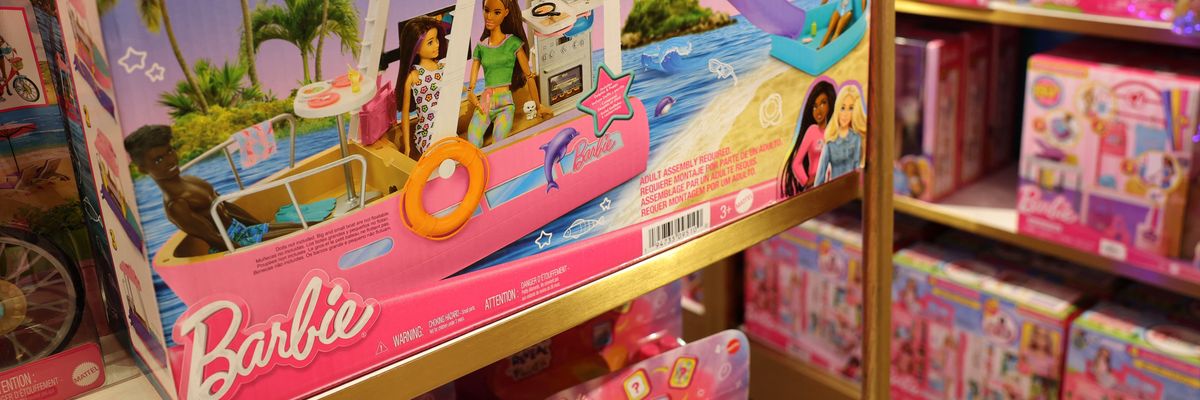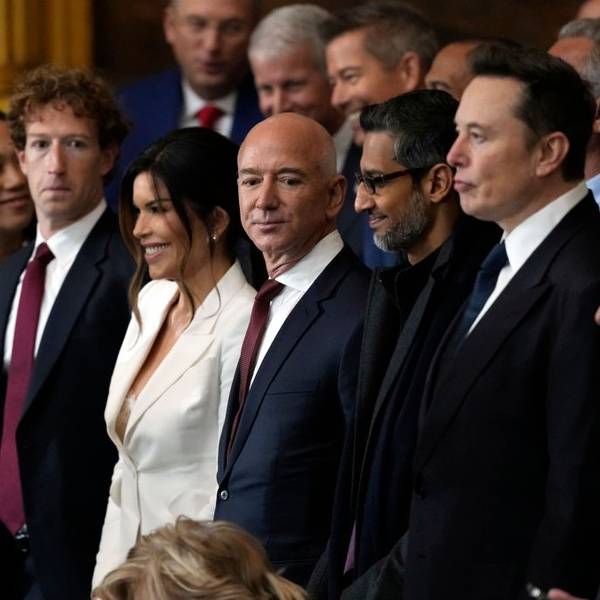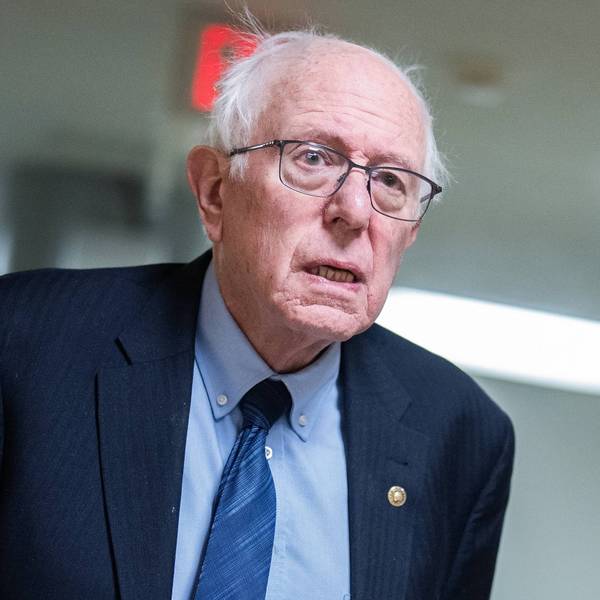
A Barbie play set for sale at FAO Schwarz toy store in New York City on April 8, 2025.
Watchdog Warns Against 'Reckless and Dangerous' Partnership Between Toy and AI Giants
"This should be obvious but apparently we have to say it: Keep AI out of children's toys," said one advocacy group.
The watchdog group Public Citizen on Tuesday denounced a recently unveiled "strategic collaboration" between the toy company Mattel and the artificial intelligence firm OpenAI, maker of ChatGPT, alleging that the partnership is "reckless and dangerous."
Last week, the two companies said that they have entered into an agreement to "support AI-powered products and experiences based on Mattel's brands."
"By using OpenAI's technology, Mattel will bring the magic of AI to age-appropriate play experiences with an emphasis on innovation, privacy, and safety," according to the statement. They expect to announce their first shared product later this year.
Also, "Mattel will incorporate OpenAI's advanced AI tools like ChatGPT Enterprise into its business operations to enhance product development and creative ideation, drive innovation, and deepen engagement with its audience," according to the statement.
Mattel's brands include several household names, such as Barbie, Hot Wheels, and Polly Pocket.
"This should be obvious but apparently we have to say it: Keep AI out of children's toys. Our kids should not be used as a social experiment. This partnership is reckless and dangerous. Mattel should announce immediately that it will NOT sell toys that use AI," wrote Public Citizen on X on Tuesday.
In a related but separate statement, Robert Weissman, co-president of Public Citizen, wrote on Tuesday that "endowing toys with human-seeming voices that are able to engage in human-like conversations risks inflicting real damage on children."
"It may undermine social development, interfere with children's ability to form peer relationships, pull children away from playtime with peers, and possibly inflict long-term harm," he added.
The statement from Public Citizen is not the only instance where AI products for children have received pushback recently.
Last month, The New York Times reported that Google is rolling out its Gemini artificial intelligence chatbot for kids who have parent-managed Google accounts and are under 13. In response, a coalition led by Fairplay, a children's media and marketing industry watchdog, and the Electronic Privacy Information Center (EPIC) launched a campaign to stop the rollout.
"This decision poses serious privacy and online safety risks to young children and likely violates the Children's Online Privacy Protection Act (COPPA)," according to a statement from Fairplay and EPIC.
Citing the "substantial harm that AI chatbots like Gemini pose to children, and the absence of evidence that these products are safe for kids," the coalition sent a letter to Google CEO Sundar Pichai requesting the company suspend the rollout, and a second letter to the Federal Trade Commission requesting the FTC investigate whether Google has violated COPPA in rolling out Gemini to children under the age of 13.
An Urgent Message From Our Co-Founder
Dear Common Dreams reader, The U.S. is on a fast track to authoritarianism like nothing I've ever seen. Meanwhile, corporate news outlets are utterly capitulating to Trump, twisting their coverage to avoid drawing his ire while lining up to stuff cash in his pockets. That's why I believe that Common Dreams is doing the best and most consequential reporting that we've ever done. Our small but mighty team is a progressive reporting powerhouse, covering the news every day that the corporate media never will. Our mission has always been simple: To inform. To inspire. And to ignite change for the common good. Now here's the key piece that I want all our readers to understand: None of this would be possible without your financial support. That's not just some fundraising cliche. It's the absolute and literal truth. We don't accept corporate advertising and never will. We don't have a paywall because we don't think people should be blocked from critical news based on their ability to pay. Everything we do is funded by the donations of readers like you. Will you donate now to help power the nonprofit, independent reporting of Common Dreams? Thank you for being a vital member of our community. Together, we can keep independent journalism alive when it’s needed most. - Craig Brown, Co-founder |
The watchdog group Public Citizen on Tuesday denounced a recently unveiled "strategic collaboration" between the toy company Mattel and the artificial intelligence firm OpenAI, maker of ChatGPT, alleging that the partnership is "reckless and dangerous."
Last week, the two companies said that they have entered into an agreement to "support AI-powered products and experiences based on Mattel's brands."
"By using OpenAI's technology, Mattel will bring the magic of AI to age-appropriate play experiences with an emphasis on innovation, privacy, and safety," according to the statement. They expect to announce their first shared product later this year.
Also, "Mattel will incorporate OpenAI's advanced AI tools like ChatGPT Enterprise into its business operations to enhance product development and creative ideation, drive innovation, and deepen engagement with its audience," according to the statement.
Mattel's brands include several household names, such as Barbie, Hot Wheels, and Polly Pocket.
"This should be obvious but apparently we have to say it: Keep AI out of children's toys. Our kids should not be used as a social experiment. This partnership is reckless and dangerous. Mattel should announce immediately that it will NOT sell toys that use AI," wrote Public Citizen on X on Tuesday.
In a related but separate statement, Robert Weissman, co-president of Public Citizen, wrote on Tuesday that "endowing toys with human-seeming voices that are able to engage in human-like conversations risks inflicting real damage on children."
"It may undermine social development, interfere with children's ability to form peer relationships, pull children away from playtime with peers, and possibly inflict long-term harm," he added.
The statement from Public Citizen is not the only instance where AI products for children have received pushback recently.
Last month, The New York Times reported that Google is rolling out its Gemini artificial intelligence chatbot for kids who have parent-managed Google accounts and are under 13. In response, a coalition led by Fairplay, a children's media and marketing industry watchdog, and the Electronic Privacy Information Center (EPIC) launched a campaign to stop the rollout.
"This decision poses serious privacy and online safety risks to young children and likely violates the Children's Online Privacy Protection Act (COPPA)," according to a statement from Fairplay and EPIC.
Citing the "substantial harm that AI chatbots like Gemini pose to children, and the absence of evidence that these products are safe for kids," the coalition sent a letter to Google CEO Sundar Pichai requesting the company suspend the rollout, and a second letter to the Federal Trade Commission requesting the FTC investigate whether Google has violated COPPA in rolling out Gemini to children under the age of 13.
The watchdog group Public Citizen on Tuesday denounced a recently unveiled "strategic collaboration" between the toy company Mattel and the artificial intelligence firm OpenAI, maker of ChatGPT, alleging that the partnership is "reckless and dangerous."
Last week, the two companies said that they have entered into an agreement to "support AI-powered products and experiences based on Mattel's brands."
"By using OpenAI's technology, Mattel will bring the magic of AI to age-appropriate play experiences with an emphasis on innovation, privacy, and safety," according to the statement. They expect to announce their first shared product later this year.
Also, "Mattel will incorporate OpenAI's advanced AI tools like ChatGPT Enterprise into its business operations to enhance product development and creative ideation, drive innovation, and deepen engagement with its audience," according to the statement.
Mattel's brands include several household names, such as Barbie, Hot Wheels, and Polly Pocket.
"This should be obvious but apparently we have to say it: Keep AI out of children's toys. Our kids should not be used as a social experiment. This partnership is reckless and dangerous. Mattel should announce immediately that it will NOT sell toys that use AI," wrote Public Citizen on X on Tuesday.
In a related but separate statement, Robert Weissman, co-president of Public Citizen, wrote on Tuesday that "endowing toys with human-seeming voices that are able to engage in human-like conversations risks inflicting real damage on children."
"It may undermine social development, interfere with children's ability to form peer relationships, pull children away from playtime with peers, and possibly inflict long-term harm," he added.
The statement from Public Citizen is not the only instance where AI products for children have received pushback recently.
Last month, The New York Times reported that Google is rolling out its Gemini artificial intelligence chatbot for kids who have parent-managed Google accounts and are under 13. In response, a coalition led by Fairplay, a children's media and marketing industry watchdog, and the Electronic Privacy Information Center (EPIC) launched a campaign to stop the rollout.
"This decision poses serious privacy and online safety risks to young children and likely violates the Children's Online Privacy Protection Act (COPPA)," according to a statement from Fairplay and EPIC.
Citing the "substantial harm that AI chatbots like Gemini pose to children, and the absence of evidence that these products are safe for kids," the coalition sent a letter to Google CEO Sundar Pichai requesting the company suspend the rollout, and a second letter to the Federal Trade Commission requesting the FTC investigate whether Google has violated COPPA in rolling out Gemini to children under the age of 13.

